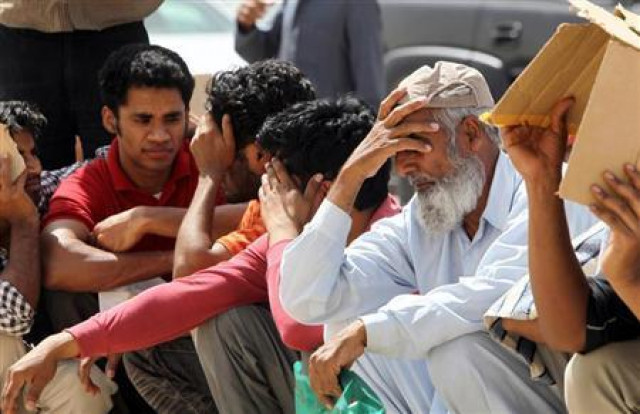Saudi Arabia warns foreign workers to get permits or get out
Foreign workers make about a third of the country's 27 million population.

Illegal immigrant workers wait in line at the Saudi immigration offices at the Alisha area, west of Riyadh May 26, 2013. PHOTO: REUTERS
The kingdom had turned a blind eye to minor violations of its strict labour regulations for decades, allowing an influx of cheap labour used both by companies and as domestic workers.
Yemen, Egypt, Lebanon, Ethiopia, India, Pakistan, Sri Lanka, Bangladesh, Indonesia and the Philippines all have large numbers of citizens working in Saudi Arabia and all rely heavily on
their remittances.
Till the end of June, reports indicated the presence of at least 50, 000 illegal immigrants from Pakistan working in Saudi Arabia.
Remittances sent home by overseas Pakistanis touched $12.8 billion in 11 months (July-May 2012-13) of the current fiscal year with the hope that the figure will cross $15 billion by year-end. However, the situation in Saudi Arabia may serve as a stumbling block.
As part of a series of reforms over the last two years, Saudi Arabia has tried to free up jobs for its own citizens, 12 per cent of whom are unemployed, according to official data.
The figure does not include the much larger number of people who are jobless but not looking for work.
Senior Saudis have frequently spoken of efforts to raise employment among locals as one of the biggest long-term challenges facing the world's top oil exporter.
A majority of the Saudi workforce is employed by the government, Central Bank figures show, but efforts to reduce joblessness by stimulating the economy with free market reforms over the past decade have mostly created posts for expatriates.
Companies face fines and hiring restrictions if they fail to meet their quotas for local hires.
At the same time, the government has introduced a levy of 2,400 riyals ($640) on each foreign worker employed by a company over the number of Saudi nationals it employs. The fee is payable each year when an expatriate's work permit is renewed.
Extension of Amnesty Period
Early this year Riyadh started an unprecedented crackdown on
expatriates who were working for a different company than that listed on their residence visa or were employed in a different professional field.
In July, Saudi Arabia extended the amnesty enabling illegal foreign workers to regularise their status or return home without prosecution, now due to expire in November.
On November 4, the crackdown will resume, and the Labour Ministry said on Tuesday it would form inspection teams to raid companies while Interior Ministry officials check papers on the street.
Arab News newspaper reported last month that 5.3 million foreign workers had put their papers in order since April.
Hundreds of thousands of others left the country during that time, officials have said.
A text message sent to Saudi mobile phones on Monday read that "the deadline to correct status is approaching. Quickly rectify your situation to avoid punishment after November 4."



















COMMENTS
Comments are moderated and generally will be posted if they are on-topic and not abusive.
For more information, please see our Comments FAQ